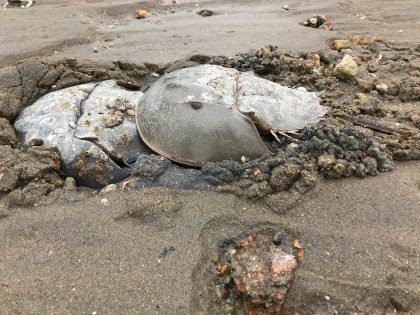

Legal harvesting as well as poaching have contributed to a steep population decline. Horseshoe crabs are in peril, and so are the birds that rely on their eggs for food
The Connecticut Audubon Society is calling on state officials to ban the harvest of horseshoe crabs in Connecticut and to increase law enforcement efforts to curtail illegal horseshoe crab harvesting.
Why is this important?
Horseshoe crabs have been in decline in Long Island Sound for at least 15 years. Not only are these harmless, ancient creatures themselves jeopardized, the migratory shorebirds that eat their protein-rich eggs are also imperiled. These include federally-threatened Red Knots.
The horseshoe crab decline in Long Island Sound, and especially along Delaware Bay, has led to a near collapse of the population of Red Knots.
Sadly, a Red Knot on Connecticut's beaches now is a noteworthy occasion.
Horseshoe crabs are caught commercially in Long Island Sound to use as bait in the eel and whelk/conch fisheries. From 2013 through 2018, about 20,000 crabs per year were taken legally.
But researchers say many thousands are also taken illegally.
For the sake of the horseshoe crabs, the Red Knots and other shorebirds, and the intricate ecology of Long Island Sound, we're calling for a ban and for better law enforcement.
The Connecticut Department of Energy and Environmental Protection is considering changing the state's horseshoe crab regulations. The DEEP will hold a public meeting on the issue at 7 p.m. on Thursday, February 20, at its Marine Headquarters, 333 Ferry Road, Old Lyme.
Connecticut Audubon will be there to speak out on the issue.
This is an excellent chance to make your voice heard on protecting both horseshoe crabs and vulnerable birds such as the Red Knot. Follow this link for more details on ctaudobon.org
N